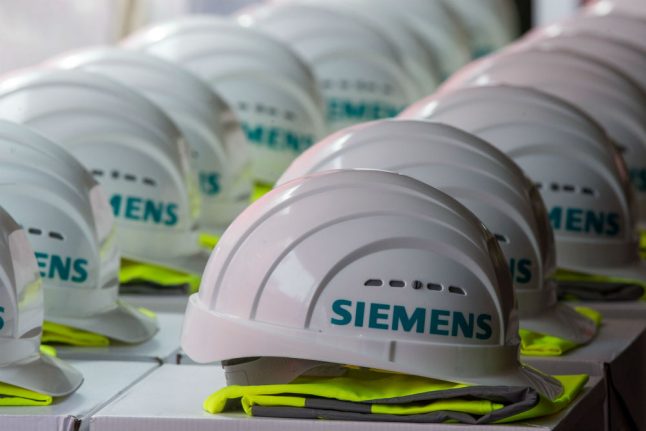A total of 6,900 workers are set to lose their jobs, around half of them in Germany, where Siemens also plans to close sites in the country's economically weaker east.
“The power industry is experiencing disruption of unprecedented scope and speed,” board member Lisa Davis said in a statement, saying layoffs were necessary to keep Siemens competitive.
The Munich-based group says global demand for the large turbines its power and gas unit produces “has fallen drastically” as renewable energy has become more popular.
This has sapped profitability as there is not enough demand to keep its factories turning.
In Germany, that division alone will shed 2,600 jobs and close sites in Goerlitz and Leipzig, both in the former communist east.
“This is sad news… a sudden bolt from the blue for Leipzigers,” said Stanislaw Tillich, premier of Saxony state.
Some 1,100 jobs are set to go in the rest of Europe, while the US will see 1,800 layoffs.
German employee representatives have vowed to resist job cuts, as they would follow on the heels of flourishing annual results for the sprawling group.
Chief executive Joe Kaeser had already warned of “painful cuts” last week, even as Siemens reported 11 percent growth in net profit for 2016-17, to €6.2 billion ($7.3 billion).
But he had pledged to “soften the blow” by reassigning or retraining workers, a promise the group reiterated Thursday.
“Siemens must gradually ask itself, do we want to remain an integrated technology group, or is it only about pleasing shareholders?” Juergen Wechsler, head of the powerful IG Metall union in Bavaria, told news agency DPA.
The company – whose products range from trains to wind turbines to medical equipment – has already announced some 6,000 job cuts in its wind power unit, sapped by falling prices in major markets like India and the US.
Further site closures and layoffs would be met with “creative forms of resistance,” IG Metall board member Juergen Kerner warned in an interview with WirtschaftsWoche magazine on Wednesday.
Siemens employs around 350,000 people worldwide, with around 115,000 of them in Germany.
'Discontent and doubts'
Germany's poorer eastern states have yet to fully recover from decades of communist mismanagement and an arduous reunification with the west since 1990.
Alongside the closures in Goerlitz and Saxony, almost 900 jobs are set to go in Berlin, while the group is considering selling off a site in Thuringian state capital Erfurt.
Cuts in the east “could stoke the discontent and the doubts” that helped far-right party Alternative for Germany into parliament with 12.6 percent of the vote in September elections, outgoing economy minister Brigitte Zypries wrote in a letter to Kaeser seen by Bild newspaper.
For its part, IG Metall accused Siemens of being “irresponsible” by showing thousands of employees the door while the group as a whole is turning in healthy profits – and by failing to consult closely with workers, as was the norm at big German conglomerates for decades.
The group laid off some 15,000 people in 2013, partly as a consequence of Germany's decision to abandon nuclear energy in favour of renewables.
Under Kaeser's tenure, whole divisions have been abandoned or sold off, including household appliances, telecoms networks and nuclear and solar energy.
Tearing up a 2008 agreement that ruled out layoffs short of an “existential crisis” at the firm “would disquiet colleagues in all of the divisions,” union boss Kerner said, especially when “the group is doing well” overall.
Battling the same headwinds, Siemens' US competitor General Electric on Monday announced a restructuring of its own, with thousands of job cuts around the globe as it narrows its focus to aeronautics, health and energy.



 Please whitelist us to continue reading.
Please whitelist us to continue reading.